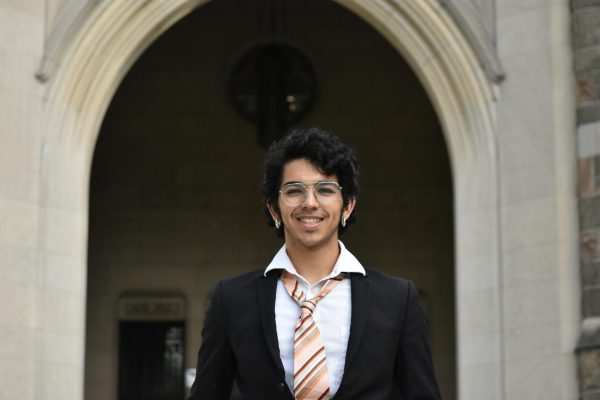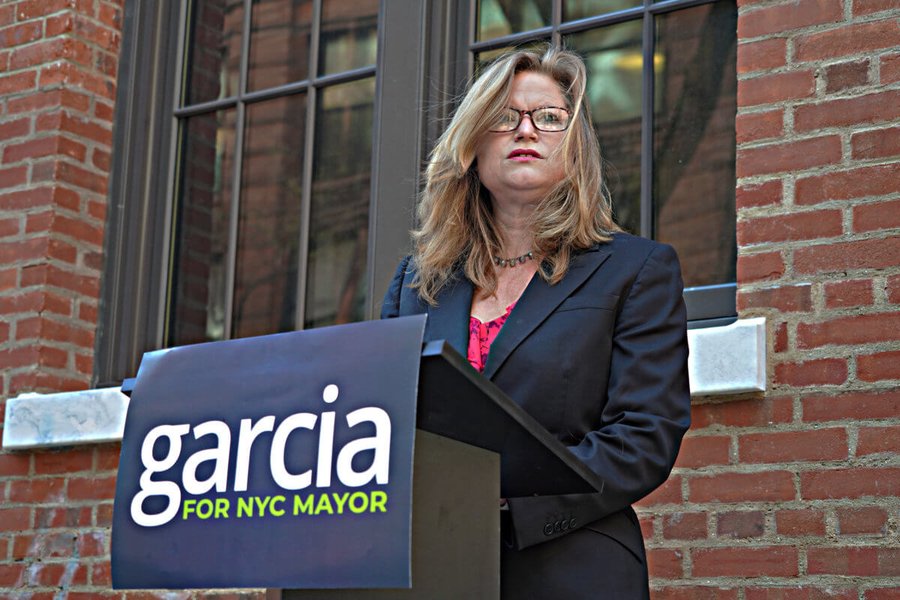Meet the Women Running for Mayor of New York City
Out of the ten major Democratic candidates in the New York mayoral election this year, only three are women. There are no female Republican candidates.
The three women in the Democratic primary candidate pool are Dianne Morales, Maya Wiley and Kathryn Garcia. The only other major female candidate in the running, Loree Sutton, dropped out of the race on March 12.
Morales announced her candidacy in November 2020 and has since been running a grassroots campaign built on a progressive platform. While Morales may not have as much formal political experience as Wiley or Garcia, Morales’ past actions have left a noticeable impact on New York City. As a former executive director of The Door, a service center for youth development, Morales launched a street outreach program that helped support homeless LGBTQ+ youth, which eventually branched out to create support programs for all NYC homeless youth as well as contribute to supportive housing development. Morales’ dedication to helping struggling youth can be seen in her experience as an executive director and CEO of Phipps Neighborhoods. Her budgeting and money-balancing skills helped create a career training program for youth interested in joining the healthcare field.
Dianne Morales’ vision for New York City is one in which every New Yorker is equally treated with three basic principles: dignity, care and solidarity. “Our city should not only be livable for a privileged few. Our city must be home to everyone who invests in it,” Morales’ campaign website reads.
Morales’s mayoral platform is built around those three principles. In appealing to New Yorkers with dignity, Morales’s platform prioritizes such issues as “Guaranteed Housing for All,” integrating schools to build equity, “Defund the Police; Fund the People,” “Protect our Immigrant Neighbors,” “Gender and Sexuality Equity” and “Democratizing Health and Care.”
Among other planks, Morales’ plan for guaranteed housing includes ending homelessness, in which she lays out a full plan that includes the conversion of hotels into permanent supportive housing, providing a path to permanent residency, and reworking the New York City Housing Authority to avoid privatization. The end goal of Morales’ housing reform is to create New York City communities that practice social mobility, self-determination and community autonomy.
As for school integration, Morales’ educational reform includes a reworking of all racist academic and scholastic policies that have historically shut out underrepresented communities, as well as balance the Department of Education’s budget to remove monetary bloat and directly fund teachers and classrooms.
Morales’ dedication to worker’s rights can be seen in her goal of protecting workers against wage theft and helping workers across the city collaborate with the union leadership.
In following the principles of “care,” Morales sets up her platform to address “Public Infrastructure Investment,” “Green Jobs, Green Food, Green Justice,” “Small Business and Cooperative Economy” and “People-Centered Tech.”
Morales’ commitment to improving public infrastructure includes plans for citywide fiber-optic network, free municipal broadband, public ownership of utilities (including electricity) and the ceasing of hostile architecture that targets homeless New Yorkers.
Finally, “solidarity” shows itself in Morales’s platform through planks like a planned “Wealth Tax,” “Free CUNY,” “Public Banking” and “Land and Development Accountability.” Plans for funding and making every City University of New York free would “recognize higher education not as a commodity for the well-off, but as a public resource to which every New Yorker has a claim,” Morales’ website says. Morales’ plans for “Land and Development Accountability” include the expansion of social housing as well as a Housing and Reparations Taskforce that investigates discriminatory and predatory housing practices.
Maya Wiley, who announced her mayoral candidacy one month before Morales did, rivals Morales’ political experience. Wiley is notable for having served as counsel to the mayor, a veteran member of NAACP Legal Defense and Education Fund, a veteran member of the ACLU and having a seat as a Chair of the Civilian Complaint Review Board.
“Maya Wiley is committed to a New York City where every New Yorker can afford to live with dignity; that’s why she is running for Mayor,” reads her campaign’s website. The policies laid out in Wiley’s platform prioritize six core issues to address in New York City: education, city services, jobs and the economy, the housing crisis, healthcare and criminal justice.
Wiley’s plans for education focus on addressing the systemic inequality at work in New York City’s educational system. Running effective individualized education programs that cater to the talents of lower-income students from underrepresented communities are at the top of Wiley’s plans for education, along with increasing support and empowerment for teachers employed within the city of New York.
Helping empower workers across New York City is also an important part of Wiley’s platform when it comes to issues of jobs and the economy. The creation of jobs, especially those in green energy and climate change-fighting industries, is central to this part of the platform. Wiley also believes employees must have the ability to form or join a union, an important part of protecting the most vulnerable workers.
Wiley’s platform on housing and homeless is also significant for helping protect vulnerable New Yorkers. “From homeless and extremely low-income New Yorkers to the middle class increasingly feeling squeezed out of the city, affordable housing that meets the needs of all our residents seems unattainable,” Wiley’s website says. However, by increasing rent subsidies in the face of eviction crises and supporting community housing planning and ownership, Wiley’s administration plans on empowering New York City tenants.
In the arena of healthcare, Wiley plans on bargaining for healthcare coverage for New Yorkers who are undocumented, working for cash or do not fit in with national healthcare policies. However, to do this Wiley must be able to balance city services and the city budget.
The platform laid out on Wiley’s website takes the importance and impact of the city budget into account. Wiley’s plans for increasing city revenue include asking for charitable donations from the wealthiest New Yorkers as well as leveraging the most valuable resources in New York City in doing transactions with businesses. These resources, according to Wiley’s campaign website, include rooftops and industry workforces.
Finally, Wiley’s moderate approach to criminal justice and policing includes increasing law enforcement accountability and creating a better connection between the police force and the communities they are assigned to protect.
The last of the three women to announce her mayoral bid, Kathryn Garcia has years of municipal service under her belt. She has served as the 43rd sanitation commissioner in New York City, as well as the Department of Environmental Protection’s incident commander. Garcia has also helped solve issues like the lead crisis and was there for New Yorkers during Superstorm Sandy in 2012.
Garcia’s platform covers important issues like post-COVID-19 economic recovery, efforts to curb climate change, housing, police reform, education and transportation.
Garcia’s plan for economic recovery has strong support for strong, local New York City businesses, as well as making standard-of-living improvements like a 24/7 subway service, universal broadband and eliminating bureaucracy by requiring small businesses to obtain only a single small business City Permit.
Combating climate change in New York City, according to Garcia’s platform, will require a fully renewable energy economy. This includes offshore wind generation and solar power distribution across the city, as well as encouraging alternative modes of transport through the installation of thousands of electric car chargers and expanded bike lane networks.
As for housing, Garcia’s platform focuses on the connection between the health of New York City residents and the homes they reside in. Garcia plans on creating 50,000 units of affordable housing, as well as an additional 10,000 units of supportive housing for the homeless population.
In police reform, Garcia’s platform encourages the use of non-violent police and social worker engagement in crimes across the city. The funding of Cure Violence groups, groups that mediate conflict and help people connect to resources, and the training of social workers would help bring down both violent and non-violent crime, according to Garcia’s platform.
Education reform in Garcia’s platform is an important step in helping make New York City a much more equitable place. Many of the most important planks in this section of the platform are focused on helping students, from kindergarten through college, succeed in the world. By re-budgeting the Department of Education to allow for a more direct flow of money into classrooms, accelerating Universal Literacy goals, and creating programs that guarantee CUNY and trade school graduates municipal employment, Garcia’s platform prioritizes students.
The last piece of Garcia’s platform, transportation, acknowledges the need to make public transportation much safer, more reliable, and much more efficient. This would include switching to electric vehicles, expanding bike lane networks and making 10,000 school buses electric.
Both the Democratic and the Republican mayoral primary elections will be held in June 2021.

Sebastian Diaz is a senior from Chapel Hill, N. C. who is double majoring in journalism and film. After starting as a news reporter for The Fordham Ram...










































































































































































































